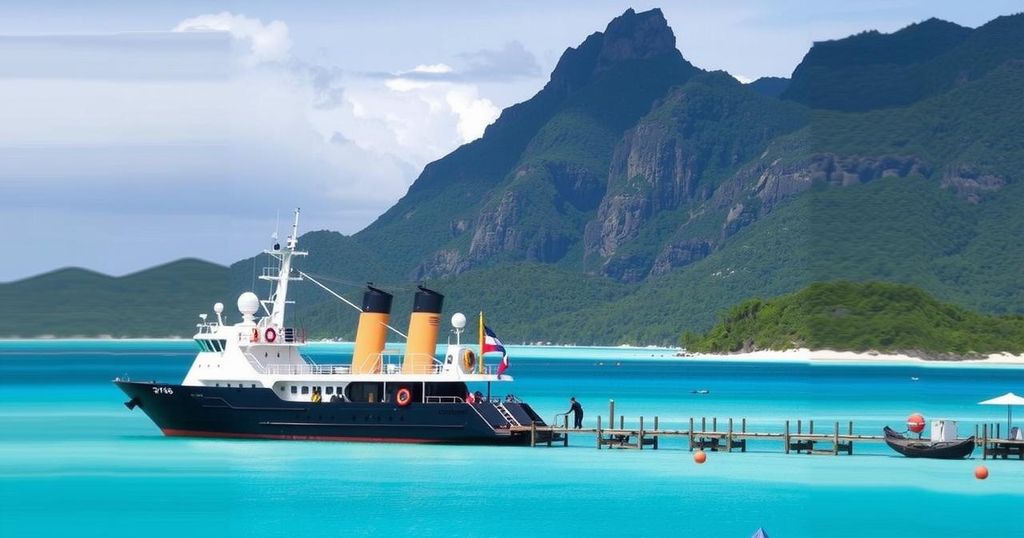UK Government Asserts Chagos Deal Progress Amid Political Scrutiny

The UK government maintains that discussions over the Chagos Islands’ future are progressing, despite Mauritius’ new leader calling for improved terms. An agreement from October outlines the transfer of sovereignty to Mauritius while the UK retains a long-term military presence on Diego Garcia. Opposition from UK politicians emphasizes concerns about national security and transparency, with calls for more detailed discussions on potential impacts from foreign influence, particularly by China. The historical context of the islands adds complexity to the negotiations, with varying international opinions on sovereignty claims.
The UK government has affirmed that negotiations over the future of the Chagos Islands remain on schedule, despite requests for improved terms by the newly elected Prime Minister of Mauritius, Navin Ramgoolam. In an agreement proposed last October, the UK would transfer sovereignty of the Chagos Islands to Mauritius while retaining a 99-year lease on the strategically important Diego Garcia military base, preferred by both UK and US forces. Foreign Office Minister Stephen Doughty emphasized the mutual benefits of the deal, noting that it ensures the base’s operational integrity and aligns with national security interests.
However, concerns have been raised by opposition parties regarding the implications of the deal, particularly as it might affect UK security and foreign relations. Shadow Foreign Secretary Dame Priti Patel criticized the government for its lack of transparency and underscored the risks posed by potential foreign encroachments on the military base, particularly from China. Despite these criticisms, Doughty assured Parliament that the terms of the agreement had been agreed upon with consideration for all parties involved, and that adequate safeguards are in place to maintain operational autonomy at Diego Garcia.
The backdrop to these discussions includes historical grievances from Mauritius, which claims it was forced to relinquish control over the islands when it gained independence from Britain in 1968. Additionally, various international bodies, including the United Nations, have predominantly sided with Mauritius regarding sovereignty claims over the Chagos Islands. This history complicates the negotiations and reflects broader geopolitical dynamics in the region, particularly amidst growing concerns about China’s influence.
In recent discourse, prominent political figures, like Nigel Farage, have expressed apprehension about the deal’s reception in the United States, particularly under the incoming Trump administration, suggesting potential resistance that could jeopardize the future of Diego Garcia. The UK government has been urged to consider the sentiments of exiled Chagossians and has faced increased pressure to clarify the terms of the agreement. In response, Doughty defended the deal, indicating that it had garnered wide support across the national security apparatus in the US and India, asserting its significance in safeguarding UK strategic interests into the next century.
The Chagos Islands, strategically located in the Indian Ocean, have been a point of contention between the United Kingdom and Mauritius following Britain’s partitioning of sovereignty in the late 1960s and early 1970s. Initially, Mauritius gained independence from Britain in 1968, but it did so under the condition of ceding the islands to the UK, which established a military base on Diego Garcia. Over the years, there has been international scrutiny and condemnation of the UK’s actions regarding the forced relocation of the Chagossian population and the sovereignty dispute. Recent negotiations signify ongoing tensions and an attempt by both nations to reconcile historical grievances with present-day security and diplomatic considerations in the context of global geopolitics, particularly with considerations of China’s strategic interests in the region.
In conclusion, while the UK government asserts that the proposed deal regarding the Chagos Islands is beneficial for all involved parties and necessary for maintaining military operations, it faces significant challenges from political opposition and international scrutiny. The historical context surrounding the islands, combined with rising global geopolitical tensions, particularly regarding influence from China, complicate the negotiations. As the new Mauritian government seeks favorable terms, the outcome of this deal remains critical to both national security and diplomatic relations moving forward.
Original Source: www.bbc.com







